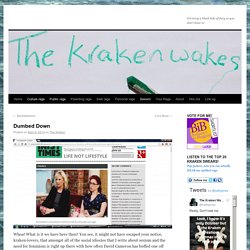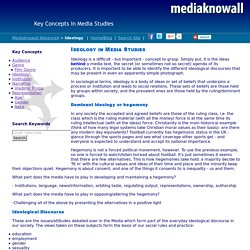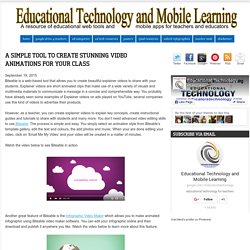

Control of the mass media. Advertising and representations of social groups. Feminism and the mass media. Socialisation throuigh the mass media. Censorship. 0415243904. Essay. Dumbed Down. Whoa!

What is it we have here then? You see, it might not have escaped your notice, kraken-lovers, that amongst all of the social idiocies that I write about sexism and the need for feminism is right up there with how often David Cameron has boffed one off over one of Boris Johnson’s digestives in an Etonian dormitory. Since Kraken Junior tore her way through my nuptial nook I’ve realised just how grim life is out there for a young girl. I’ve also realised that there are a lot of lobe-shattering opinions about how we deal with it and none has made me choke on my own tongue more than those of Body Gossip’s Natasha Devon, a campaigner who thinks that women should dumb down (her words) their fight for equality. Her latest explanation of her theory was gifted to the world via the cracking Feminist Times. “We (feminists) failed to come up with a cohesive agenda we could all agree on.
Go on, girls, read that again. They do? “Furthering female empowerment will involve compromise.” AS&A Level Key Concepts — Ideology. Ideology is a difficult - but important - concept to grasp.

Simply put, it is the ideas behind a media text, the secret (or sometimes not-so secret) agenda of its producers. It is important to be able to identify the different ideological discourses that may be present in even an apparently simple photograph. In sociological terms, ideology is a body of ideas or set of beliefs that underpins a process or institution and leads to social relations.
These sets of beliefs are those held by groups within society, and the prevalent ones are those held by the ruling/dominant groups. Dominant ideology or hegemony In any society the accepted and agreed beliefs are those of the ruling class, i.e. the class which is the ruling material (with all the money) force is at the same time its ruling intellectual (with all the ideas) force.
Ben Bagdikian. Ben Haig Bagdikian (January 30, 1920 – March 11, 2016) was an Armenian-American educator and journalist.[1] Biography[edit] Bagdikian, whose full name was Ben-Hur Bagdikian,[2] was born Jan. 30, 1920 in present-day Turkey.

His Armenian family fled the country because of persecution when he was an infant. He graduated from Clark University in Worcester, Massachusetts, in 1941 and became a journalist. He was a significant American media critic and the dean emeritus of the University of California, Berkeley Graduate School of Journalism. In 1971 whistleblower Daniel Ellsberg gave Bagdikian — then an editor at The Washington Post — portions of the Pentagon Papers, a top-secret classified history of the Vietnam War. Bagdikian died in Berkeley, California on March 11, 2016 at the age of 96.[3] Bibliography[edit] As author[edit]
Select1. Educational Technology and Mobile Learning: A Simple Tool to Create Stunning Video Animations for Your Class. September 19, 2015 Biteable is a web-based tool that allows you to create beautiful explainer videos to share with your students.

Explainer videos are short animated clips that make use of a wide variety of visuals and multimedia materials to communicate a message in a concise and comprehensible way. You probably have already seen some examples of Explainer videos on ads played on YouTube, several companies use this kind of videos to advertise their products. However, as a teacher, you can create explainer videos to explain key concepts, create instructional guides and tutorials to share with students and many more.
You don’t need advanced video editing skills to use Biteable. The process is simple and easy. Watch the video below to see Biteable in action Another great feature of Biteable is the Infographic Video Maker which allows you to make animated infographic using Biteable video maker software. Biteable is free to use. Essay (1) What is Mass Media? (with pictures) - wiseGEEK. How to write News report articles. Dhresourcesforprojectbuilding [licensed for non-commercial use only] / Digital Humanities Tools.
Guides to Digital Humanities | Tutorials | Tools | Examples | Data Collections & Datasets Online or downloadable tools that are free, free to students, or have generous trial periods without tight usage constraints, watermarks, or other spoilers.
![dhresourcesforprojectbuilding [licensed for non-commercial use only] / Digital Humanities Tools](http://cdn.pearltrees.com/s/pic/th/licensed-commercial-humanities-80078769)
Bias toward tools that can be run online or installed on a personal computer without needing an institutional server. (Also see Other Tool Lists) Note about organization: At present, these tools are organized in an improvised scheme of categories. For the most deliberate and comprehensive taxonomy of digital-humanities activities, objects, and techniques currently available, see TaDiRAH. . = Currently a tool that is prevalent, canonical, or has "buzz" in the digital humanities community. = Other tools with high power or general application Audio Tools (see Audio Editing Tutorials)Audiotool (free, web-based application for electronic music production; meant to serve as a fully functioning virtual studio.